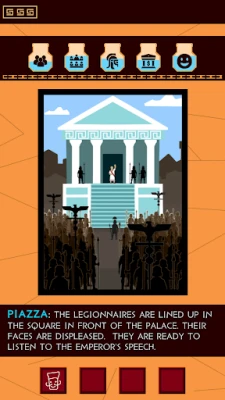
Latest Version
1.0
April 15, 2025
Andrey Grigoryan
Games
Android
0
Free
com.TheMoneySuitcase.Emperor
Report a Problem
More About Emperor simulator
The Intricate Dynamics of Power in Ancient Rome: A Study of Politics, Society, and Leadership
In the heart of the Roman Empire, a complex web of political intrigue and societal demands shaped the landscape of power. Senators, military leaders, and the common people all played pivotal roles in this dynamic environment. Understanding these relationships is crucial to grasping the essence of Roman governance and the challenges faced by its emperors.
Senatorial Schemes: The Power Struggle
Within the Senate, a constant battle for influence and control unfolded. Senators often engaged in elaborate schemes against one another, driven by ambition and the desire for power. This political maneuvering was not merely a game of strategy; it was a matter of survival in a system where loyalty could shift like sand. The competition among senators created a volatile atmosphere, where alliances were formed and broken, and betrayal lurked around every corner.
The Plebeians: Voices of the Common People
Amidst the political machinations, the plebeians—the common citizens of Rome—demanded their share of attention. Their cries for "bread and circuses" reflected a deep-seated resentment towards the wealthy elite. The plebs sought not only sustenance but also entertainment, a distraction from their daily struggles. This demand for basic needs and leisure activities highlighted the growing divide between the rich and the poor, forcing emperors to navigate the delicate balance between appeasing the masses and maintaining the loyalty of the elite.
Military Leaders: The Quest for Recognition
The Roman legions, the backbone of the empire, were led by ambitious military leaders who sought greater rewards for their service. These leaders were not just soldiers; they were power players in their own right, often leveraging their military successes to gain political influence. Their demands for higher salaries and honors posed a significant challenge to the treasury, which was already under strain. The loyalty of the military was essential for any emperor, making it imperative to address their grievances while managing the empire's finances.
The Treasury: The Lifeblood of the Empire
The treasury served as the empire's financial foundation, crucial for maintaining order and stability. Without adequate funds, the empire risked descending into chaos and desolation. Emperors faced the daunting task of balancing expenditures on military campaigns, public welfare, and lavish displays of power. The management of the treasury required astute decision-making and foresight, as any misstep could lead to unrest among the populace or a weakened military.
The Burden of Leadership: Decisions and Pleasures
Leading an empire was fraught with challenges, demanding difficult decisions at every turn. Emperors had to weigh the needs of the plebeians against the ambitions of the senators and the demands of military leaders. This constant juggling act left little room for personal indulgence. However, the pursuit of personal pleasures was not merely a luxury; it was a necessary escape from the burdens of leadership. After all, what was the point of power if it did not allow for moments of enjoyment and respite?
Conclusion: The Complexity of Roman Governance
The intricate dynamics of power in ancient Rome reveal a society marked by ambition, conflict, and the relentless pursuit of stability. Senators schemed against one another, plebeians clamored for their rights, and military leaders sought recognition—all while emperors navigated the treacherous waters of governance. Understanding these relationships provides valuable insights into the challenges faced by those who wielded power in one of history's most formidable empires. The legacy of Roman governance continues to resonate, reminding us of the timeless complexities of leadership and the delicate balance required to maintain order in a diverse society.
Rate the App
User Reviews
Popular Apps










Editor's Choice































